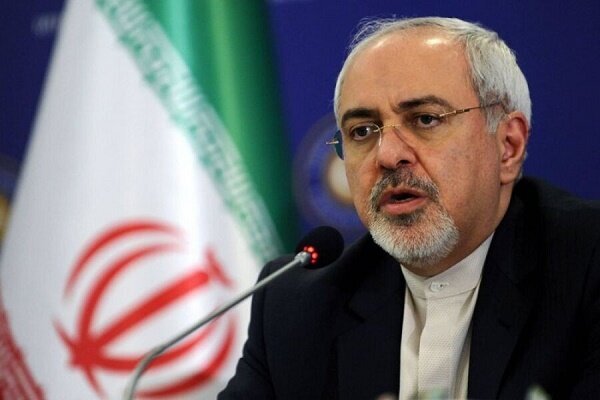Have E3 read JCPOA paragraph 36? Zarif asks

TEHRAN – Iranian Foreign Minister Mohammad Javad Zarif has responded to a European statement calling on Iran to halt its nuclear activities and return to compliance with the 2015 nuclear deal.
The European signatories to the nuclear deal, officially known as the Joint Comprehensive Plan of Action (JCPOA), issued a joint statement on Friday to express “grave concern” over Iran’s recent nuclear activities.
“We, the governments of France, Germany and the United Kingdom, note with grave concern the recent confirmation by the IAEA that Iran is producing uranium metal in violation of the JCPOA. Under the JCPOA, Iran committed not to engage in producing or acquiring uranium metal or to conduct research and development on uranium metallurgy for 15 years,” the statement said.
The three European countries – collectively known as the E3- tacitly accused Iran of trying to developing a nuclear weapon.
“We strongly urge Iran to halt these activities without delay and not to take any new non-compliant steps on its nuclear program. In escalating its non-compliance, Iran is undermining the opportunity for renewed diplomacy to fully realize the objectives of the JCPOA,” the E3 statement concluded.
This statement elicited a strong response from the chief Iranian diplomat.
Zarif said Iran’s nuclear activities were done in line with paragraph 36 of the JCPOA. He wondered whether the Europeans had read the terms of the nuclear deal.
“Have our E3 partners ever read para 36 of JCPOA & Iran's many letters on that basis? By what logic is the onus on IRAN to stop its remedial measures undertaken a full year after the US withdrew from—and continues to violate—the JCPOA? What have E3 done to fulfill their duties?” the Iranian foreign minister said in a tweet on Friday.
The Europeans have increasingly called on Iran to reverse its nuclear measures, which were adopted in response to the U.S. withdrawal from the JCPOA, since Joe Biden won the U.S. presidential election in November.
In January, Zarif strongly criticized the E3 for doing nothing to save the JCPOA.
“E3 leaders—who rely on signature of OFAC functionaries to carry out their obligations under JCPOA—have done ZILCH to maintain JCPOA. Remember @EmmanuelMacron's stillborn initiative or UK non-payment of court-ordered debt? JCPOA is alive because of Iran and not E3, @JY_LeDrian,” the top Iranian diplomat tweeted on January 17.
The foreign minister also said France is destabilizing the West Asia region and protecting those who “chainsaw their critics.”
“Dear colleague: You kick-started your cabinet career with arms sales to Saudi war criminals. Avoid absurd nonsense about Iran. Reality check: YOU are destabilizing OUR region. Stop protecting criminals who chainsaw their critics and use YOUR arms to slaughter children in Yemen,” Zarif said in a separate tweet.
He was apparently responding to remarks by French Foreign Minister Jean-Yves Le Drian in which he accused Iran of trying to acquire nuclear weapons capacity.
“The Trump administration chose what it called the maximum pressure campaign on Iran. The result was that this strategy only increased the risk and the threat,” Le Drian told the Journal du Dimanche newspaper, according to a Reuters report. “This has to stop because Iran and - I say this clearly - is in the process of acquiring nuclear (weapons) capacity.”
Le Drian also said that the return of Iran and the United States to the nuclear deal –formally called JCPOA – is not enough.
“Tough discussions will be needed over ballistic proliferation and Iran’s destabilization of its neighbors in the region,” he said.
Iran has rejected the European demands about the need to discuss non-nuclear issues in any future nuclear talks, saying the nuclear deal was solely aimed to address the nuclear program, not other thorny issues.
In an interview with CNN’s Christiane Amanpour on February 2, Zarif had said the JCPOA did not include Iran’s defensive capabilities, because the U.S. was not prepared to stop its arms sales to the region as a precondition.
“The nuclear deal was negotiated based on what we could agree and what we could not agree. This is the deal that was made,” Zarif said.
On the other hand, the new U.S. administration said it wants to rejoin the JCPOA only to use it as starting point for negotiations on Iran’s missile program and its regional activities.
SM/PA
